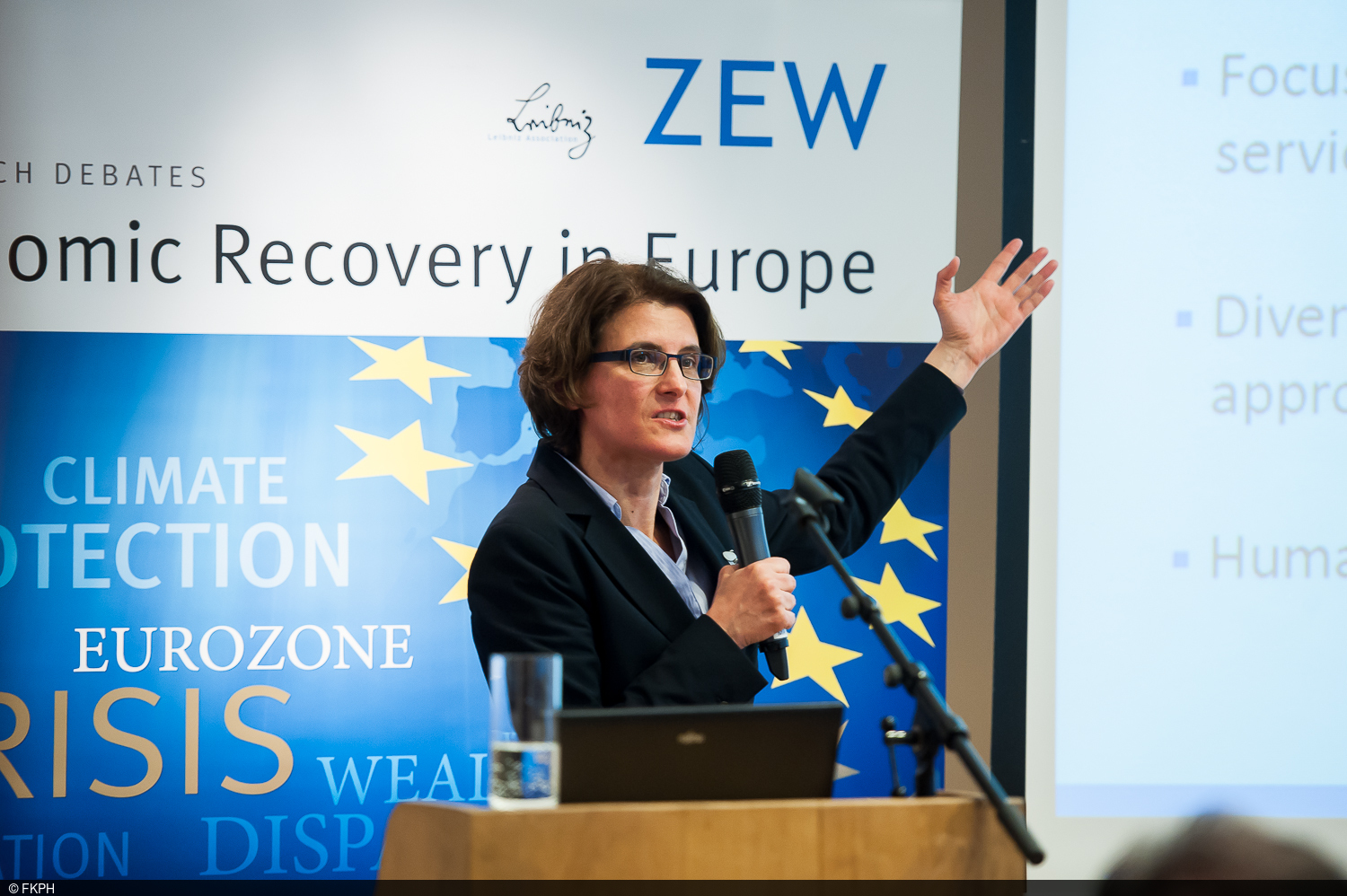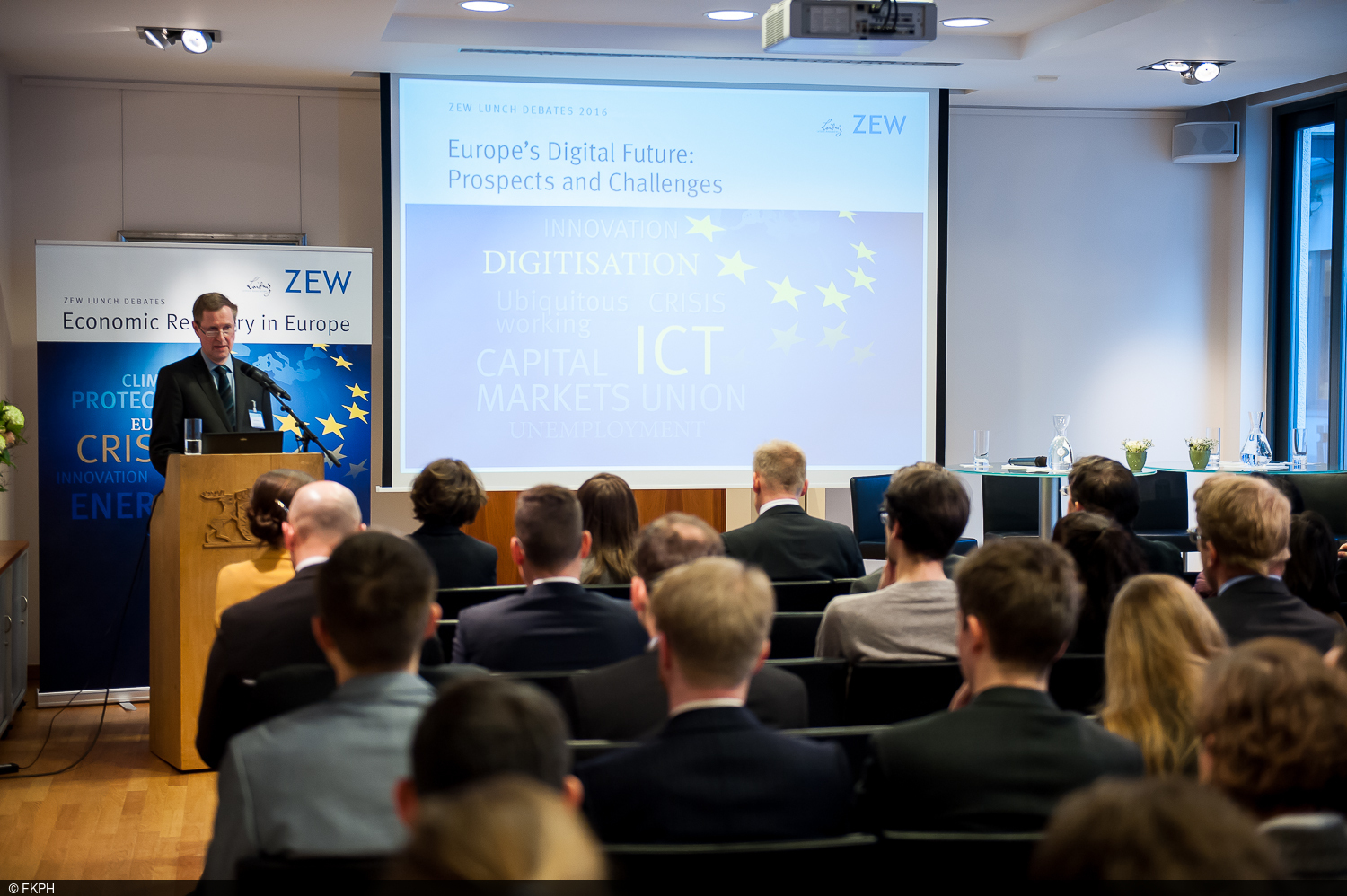ZEW Lunch Debate in Brussels - Digitisation Will Change the Workplace
ZEW Lunch Debate in BrusselsDigitisation is making rapid progress, thereby shaping the way in which people communicate. At the same time, Information and Communication Technologies (ICT) are being increasingly implemented in the workplace. Digitisation of the entire supply chain is a worthy aim; one which will lead to increased growth and greater levels of innovation. Until now, this process of digitisation has been largely determined by corporations in Asia and North America. In order to regain Europe's competitiveness in this field, the European Commission has initiated the "Digital Agenda for Europe". The focus of the Lunch Debate "Europe's Digital Future: Prospects and Challenges", which took place on February 17, 2016 at the Representation of the State of Baden-Württemberg to the European Union in Brussels, organised by the Centre for European Economic Research (ZEW), were the challenges posed to society, politics and the economy by the process of digitisation.
"Digitisation must always be considered from two sides," emphasised ZEW President Clemens Fuest, at the opening of the Lunch Debate. On the one hand, digitisation provides almost innumerable opportunities for new developments to take place. On the other hand, however, as Fuest explained to the audience of around 70 guests, which included representatives from the European Parliament and the European Commission, as well as participants from the fields of academia, industry and civil society, digitisation is also associated with fears of job losses.
In her introductory lecture, Professor Irene Bertschek, head of the ZEW Research Department "Information and Communication Technologies", explained that one opportunity opened up by digitisation is the step away from mass production, towards the production of individualised products. The economist demonstrated that in Europe, numerous national and transnational plans for digitisation are being implemented. Digitisation remains, however, "an extremely complex undertaking". It is therefore necessary to concentrate on several key aims. Of central importance is the expansion of broadband, data protection, improving the economy's ability to adapt to digitisation, and providing workers with training.
"Workers must retain the same rights and securities"
Lucilla Sioli, PhD, head of Unit "4. European Semester and Knowledge Base" in the Directorate-General for Communication Networks, Content and Technology (DG Connect) at the European Commission, illustrated the progress thus made in terms of implementing such plans. "Digitisation has progressed to varying extents within Europe," explained Sioli in her presentation, whilst emphasising the importance of an integrated European market to increase the possibility of benefiting from opportunities for growth arising from digitisation. There is, however, still a long way to go.
The subsequent panel discussion, which was moderated by Clemens Fuest, was opened by Laurent Zibell, PhD, Policy Advisor for technology, innovation and ICT in the trade union IndustriALL European trade union. "Digitisation will change the workplace," he explained. According to Zibell, productivity levels will increase. This, however, must not be at the expense of workers. Sioli concurred with Zibell, adding that "despite digitisation, workers must retain the same rights and securities which they currently have." Irene Bertschek emphasised that it is not yet clear what exactly the consequences of digitisation will be for workers in a number of fields. "Studies carried out by ZEW, for example, indicate that particularly in the case of young people, crowd-working simply adds another string to employees' bows, and does not necessarily threaten the usual working model," she explained.
"Over-regulation stifles positive developments"
ZEW President Fuest finally posed the question, as to whether digitisation might lead to a shift of influence between businesses as well as between states. "Power relations between firms have already shifted – away from the real economy, toward the internet economy," emphasised Zibell. "The internet, however, also increases the visibility of smaller firms, so that they are able to profit from a larger market," explained Sioli. In order to prevent the development of overly influential conglomerates, these developments must continue to be observed. This is the task of governments and the EU Commission.
In this context, Zibell also called for increased regulation of natural monopolies. ZEW economist Bertschek, however, countered Zibell with the argument that, "over-regulation should be avoided, as it stifles positive developments."
Alongside changes in the workplace, the panel discussion also addressed further aspects of the digital transformation. Where will future innovations take place – in Europe or in Silicon Valley? To what extent does the EU need to catch up in terms of expanding its network infrastructure? These questions indicate in just how many fields further research is required.
The ZEW Lunch Debate series was launched in 2014. It provides a lunchtime platform for experts to discuss current economic challenges facing Europe. Events within this series, which take place in Brussels on a regular basis, provide an opportunity for controversial, open and committed debate.










